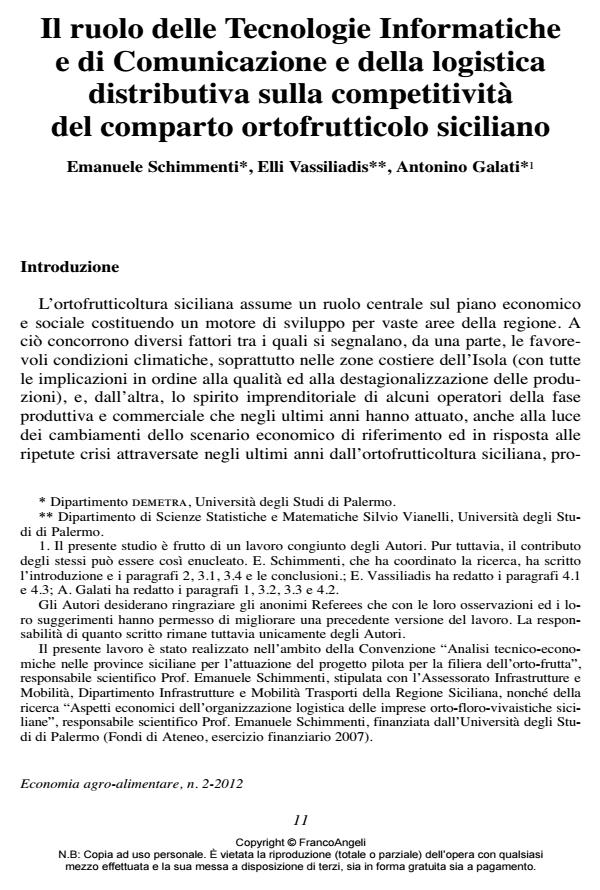Il ruolo delle Tecnologie Informatiche e di Comunicazione e della logistica distributiva sulla competitività del comparto ortofrutticolo siciliano
Titolo Rivista ECONOMIA AGRO-ALIMENTARE
Autori/Curatori Emanuele Schimmenti, Elli Vassiliadis, Antonio Galati
Anno di pubblicazione 2012 Fascicolo 2012/2
Lingua Italiano Numero pagine 30 P. 11-40 Dimensione file 727 KB
DOI 10.3280/ECAG2012-002002
Il DOI è il codice a barre della proprietà intellettuale: per saperne di più
clicca qui
Qui sotto puoi vedere in anteprima la prima pagina di questo articolo.
Se questo articolo ti interessa, lo puoi acquistare (e scaricare in formato pdf) seguendo le facili indicazioni per acquistare il download credit. Acquista Download Credits per scaricare questo Articolo in formato PDF

FrancoAngeli è membro della Publishers International Linking Association, Inc (PILA), associazione indipendente e non profit per facilitare (attraverso i servizi tecnologici implementati da CrossRef.org) l’accesso degli studiosi ai contenuti digitali nelle pubblicazioni professionali e scientifiche.
In recent years, the market globalization process has deeply altered the international competitive scene, leading, inevitably, to a revision of companies’ strategies and organization structures. It is now widely accepted that Information and Communication Technology (ict) and supply chain logistics management, have an important role in increasing the competitive potential of each company and in the development of entire economic sectors. The importance of these factors for the business strategies of firms, has generated increasing research attention towards the study of their economic and social impact, concerning both the spread of modern information and communication technologies and logistics. This paper mainly proposes, through a direct survey conducted on a group of firms (production and commercial companies), working in the Sicilian fruit and vegetable sector - a strategic sector in the economic and social field for most of the region - to provide empirical evidence regarding the degree of diffusion of ict and its use, as well as on business relationships with the regional distribution logistics system, as they are two of the determinants that can influence companies’ competitive potential. Through Multiple Correspondence Analysis (mca) it was possible to filter down the information from the available data and to identify two factors that describe and summarize how the surveyed firms behave. In particular, the analysis highlighted the close connection between the diffusion and use of ict and logistics distribution organization and the firms’ physical and economic size. Specifically, the large-size companies, in this case represented by producer organizations and associations, have a medium-high degree of computerization and an efficient logistics organization, which allows them to interface with competitors both in the national and international market. Agricultural cooperatives and individual companies, on the other hand, though having well-developed infrastructure hardware and software, limit their use to basic functions, but above all have greater needs in terms of logistics structures, which are scantly distributed in the region, and this negatively influences the efficiency of fruit and vegetable produce distribution. In this context, the competitive potential of the fruit and vegetable sector, as regards the issues under investigation, is connected, on the one hand, to companies’ recognition of the potential offered by ict and efficient logistics and, on the other, to government intervention aimed at overcoming the region’s infrastructure limits which are at the heart of inefficiencies in the distribution system.
Parole chiave:Fruit and vegetables industry, Information & Communication Technology, logistics
Jel codes:Q12, Q13, M15, R41
- Short food supply chains – a growing movement. The case study of the Viseu Dão Lafões Region Maria Lúcia Pato, in Open Agriculture /2020 pp.806
DOI: 10.1515/opag-2020-0077
Emanuele Schimmenti, Elli Vassiliadis, Antonio Galati, Il ruolo delle Tecnologie Informatiche e di Comunicazione e della logistica distributiva sulla competitività del comparto ortofrutticolo siciliano in "ECONOMIA AGRO-ALIMENTARE" 2/2012, pp 11-40, DOI: 10.3280/ECAG2012-002002